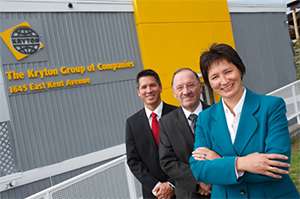How free trade is helping one B.C. business grow — at home and abroad
When news broke last month that the Trans Pacific Partnership (TPP) agreement was all but concluded after five years of negotiation, Kari Yuers knew it had the potential to open doors for her Vancouver-based business, Kryton International Inc.
On the day the mega trade deal was announced, Kari was nearly 12,000 kilometres from home, visiting her company’s Dubai office — one of seven locations they now have around the world. Just prior to that, she was in New Delhi to celebrate her company’s 20th anniversary in India.
 In many ways, Kryton is a perfect example of how free trade and a global mindset can benefit companies here in B.C. The family-run business, which manufactures and distributes concrete waterproofing systems, was founded in 1973 by Kari’s father, Ron Yuers. In the 43 years since, Kryton has grown into a world leader in its industry, exporting its product to 48 countries and employing 85 individuals worldwide.
In many ways, Kryton is a perfect example of how free trade and a global mindset can benefit companies here in B.C. The family-run business, which manufactures and distributes concrete waterproofing systems, was founded in 1973 by Kari’s father, Ron Yuers. In the 43 years since, Kryton has grown into a world leader in its industry, exporting its product to 48 countries and employing 85 individuals worldwide.
“Ron always knew he had to work globally,” says Kari, while sitting outside a meeting room at Canada Place. “When he started the company, it wasn’t like you could go on the internet and search out opportunities. He would literally get on a plane, fly somewhere, and wouldn’t buy a return ticket until he sold something.”
A legacy of free trade advocacy
But it wasn’t just his own business that Ron wanted to connect with the world. In 1985, he was appointed Chair of a special standalone committee formed by The Vancouver Board of Trade. The committee, called “Freer Trade Initiatives,” was established to investigate the benefits of increased trade between Canada and the U.S.
After a year of research, Ron presented a proposal to the National Chamber of Commerce Convention which outlined the many potential benefits. Subsequently, the Mulroney Conservative government created a whitepaper on the topic, and used it as an important election platform to their winning campaign.
At the time, the Bi-lateral Freer Trade agreement was the largest trade agreement ever between two countries, but few realize the foundation was first laid by Ron Yuers and The Vancouver Board of Trade’s board of directors.
Beyond borders
Back in the ‘70s and ‘80s, Ron was a bit of a pioneer when it came to pursuing trade opportunities abroad. These days, however, Kari says it’s important — if not imperative — that businesses broaden their horizons.
“I think many Canadian companies could benefit greatly from thinking more globally, rather than just focusing on sales in their own backyard,” she says. “If we’re going to be leaders, if not survivors, then we need to start thinking differently about who our customers are.”
That’s one thing that Kryton has done exceptionally well over the years, and it’s one of the reasons their products have been used in major overseas projects, such as the Qatar Islamic Cultural Center in Doha or the luxury, five-star Marina Bay Sands resort in Singapore.
But despite their international success, Kryton still has to overcome barriers to doing business in many foreign countries, which is why an agreement such as the TPP (which would remove tariffs on Canadian products in 11 different Pacific Rim countries) is so important to their bottom line.
“It’s not uncommon for us to have our materials taxed at 40 per cent or more coming into a country,” says Kari. “It’s not a level playing field and it’s not competitive.”
Kari adds that the TPP would also reduce the regulatory hurdles her company has to jump through any time it needs to open a new office or train new employees abroad.
For those reasons, she remains optimistic that the TPP agreement will be signed by the newly elected government. In doing so, Canada would be fostering the growth of small and medium-sized companies just like Kryton, which ultimately leads to new job opportunities and brings tax revenue back into Canada.
“I think the TPP is a huge step in improving the lives of Canadians in general. Anytime you can break down protectionist trade barriers and increase trade and commerce, economies flourish and people benefit,” says Kari. “Businesses aren’t bad things. They’re just groups of people who live and work here in B.C. and are trying to carve out a better life for themselves.”
Source: Sounding Board